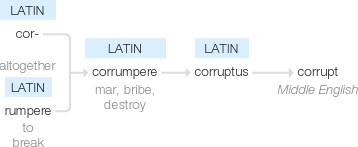Corrupt
Middle English: from Latin corruptus, past participle of corrumpere ‘mar, bribe, destroy’, from cor- ‘altogether’ + rumpere ‘to break’.
wiktionary
From Middle English corrupten, derived from Latin corruptus, past participle of corrumpō, corrumpere(“to destroy, ruin, injure, spoil, corrupt, bribe”), from com-(“together”) + rumpere(“to break in pieces”).
etymonline
corrupt (adj.)
early 14c., "corrupted, debased in character," from Old French corropt "unhealthy, corrupt; uncouth" (of language) and directly from Latin corruptus, past participle of corrumpere "to destroy; spoil," figuratively "corrupt, seduce, bribe," from assimilated form of com-, here perhaps an intensive prefix (see com-), + rup-, past participle stem of rumpere "to break," from a nasalized form of PIE *runp- "to break" (source also of Sanskrit rupya- "to suffer from a stomach-ache;" Old English reofan "to break, tear").
Meaning "decomposing, putrid, spoiled" is from late 14c. Sense of "changed for the worse, debased by admixture or alteration" (of language, etc.) is from late 14c. Meaning "guilty of dishonesty involving bribery" is from late 14c. Related: Corruptly; corruptness.
corrupt (v.)
mid-14c., "deprave morally, pervert from good to bad;" late 14c., "contaminate, impair the purity of; seduce or violate (a woman); debase or render impure (a language) by alterations or innovations; influence by a bribe or other wrong motive," from Latin corruptus, past participle of corrumpere "to destroy; spoil," figuratively "corrupt, seduce, bribe" (see corrupt (adj.)).
Intransitive sense of "putrefy, change from a sound to a putrid state" is from late 14c. Related: Corrupted; corrupting. In Middle English also corrumpen (mid-14c., along with corrumpcioun), from Old French corompre, from Latin corumpere.
